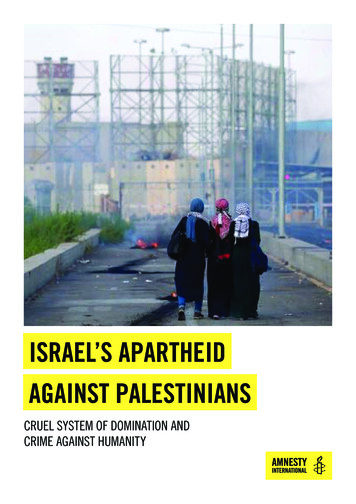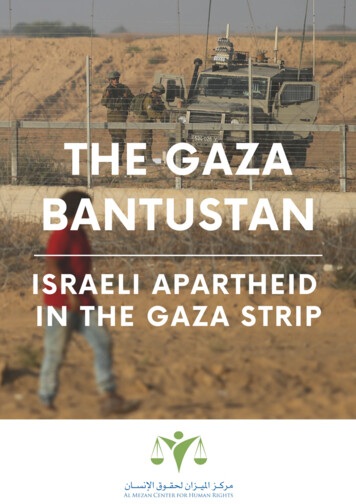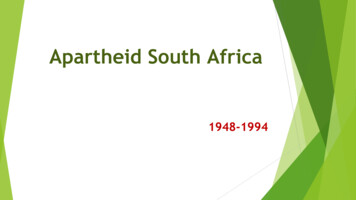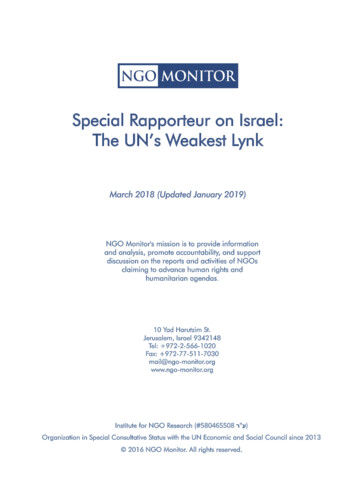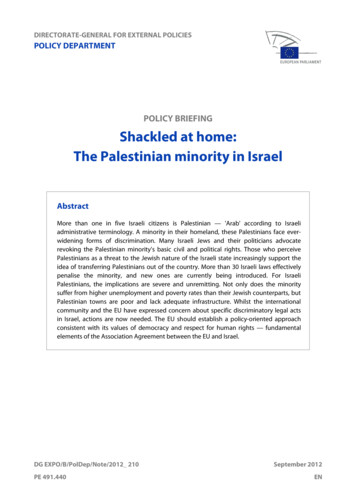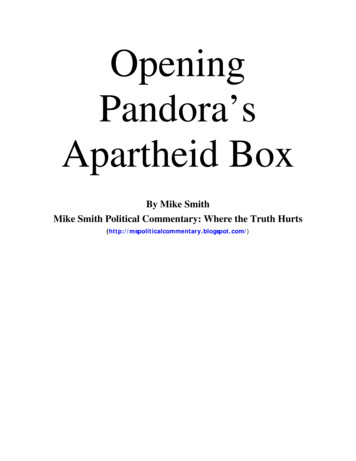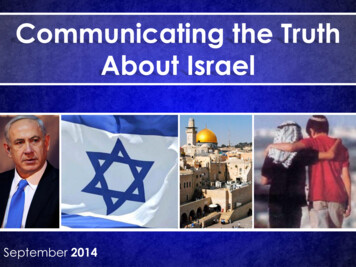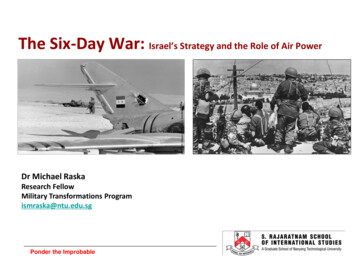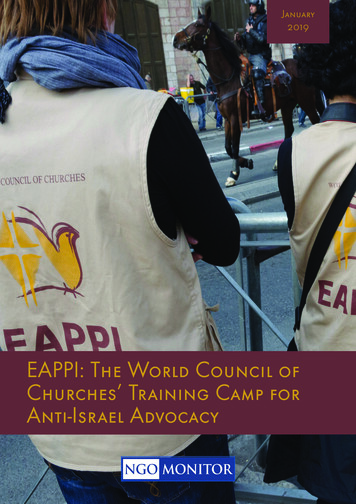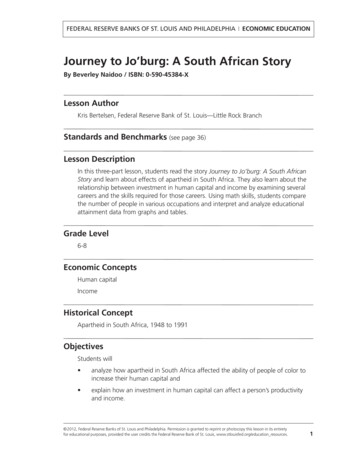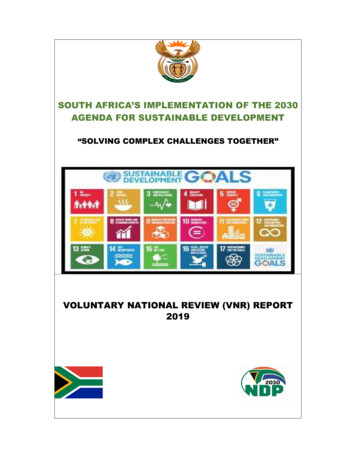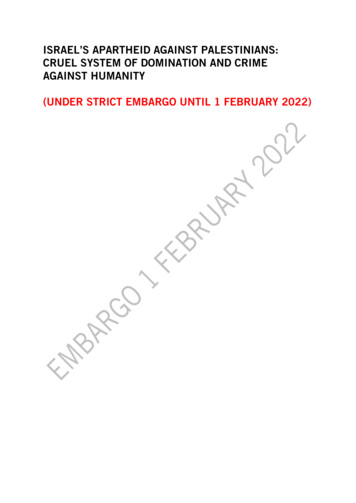
Transcription
ISRAEL’S APARTHEID AGAINST PALESTINIANS:CRUEL SYSTEM OF DOMINATION AND CRIMEAGAINST HUMANITY(UNDER STRICT EMBARGO UNTIL 1 FEBRUARY 2022)
ABBREVIATIONS AND GLOSSARYACRIAdalahAddameerAkevotAl-HaqAl MezanApartheid ConventionARIJAteret CohanimBadilBimkomB’Tselem“buffer zone”CATCEDAWCERDCESCRCivil AdministrationCOGATConvention against TortureCustodian of AbsenteePropertyCustodian for Governmentand Abandoned Property inJudea and SamariaCustodian GeneralDCI-PalestineDevelopment Authority“dual use” policydunamEladErez crossingESCWA“firing zone”GDPGishaGreen LineGRMHaaretzHaMokedHCJHRCAssociation for Civil Rights in Israel, a human rights organizationAdalah – The Legal Center for Arab Minority Rights in Israel, a human rightsorganizationAddameer Prisoner Support and Human Rights Association, a human rightsorganizationAkevot Institute for Israeli-Palestinian Conflict ResearchAl-Haq – Law in the Service of Man, a human rights organizationAl Mezan Center for Human Rights, a human rights organizationInternational Convention on the Suppression and Punishment of the Crime ofApartheidApplied Research Institute – Jerusalemformally known as Ateret Yerushalayim, a Jewish settler organizationBADIL Resource Centre for Palestinian Residency and Refugee RightsBimkom – Planners for Planning Rights, a human rights organizationB’Tselem (Israeli Information Center on Human Rights in the OccupiedTerritories), a human rights organizationaccess-restricted area located along the fence separating the Gaza Strip fromIsrael(UN) Committee against Torture(UN) Committee on the Elimination of Discrimination against Women(UN) Committee on the Elimination of Racial Discrimination(UN) Committee on Economic, Social and Cultural RightsIsraeli military unit that oversees all civilian matters for Jewish Israeli settlersand Palestinian residents in the West Bank excluding East Jerusalem(Israel’s) Coordination of Government Activities in the Territories(UN) Convention against Torture and Other Cruel, Inhuman or DegradingTreatment or Punishmenthead of an entity appointed by the Israeli minister of finance that managesabsentees’ propertyhead of an entity under the authority of the Israeli Civil Administration chargedwith managing land and property in the occupied West Bank excluding EastJerusalemhead of an entity under the authority of the Israeli Ministry of Justice thatmanages all property in Israel when the owners cannot manage it or areuntraceable, as well as playing a significant role regarding properties in EastJerusalem owned by Israelis before 1948Defense for Children International – Palestine, a human rights organizationIsraeli body established to administer the property of Palestinian refugees andother property confiscated by the statepolicy restricting Palestinian imports to the OPT of goods that Israel deems topotentially have military, as well as civilian, useland area (10 dunams 1 hectare)Elad-Ir David Foundation, a Jewish settler organizationpassenger crossing between Israel and the Gaza Strip(UN) Economic and Social Commission for Western Asialand designated by Israel for the stated purpose of military exercisesgross domestic productGisha – Legal Center for Freedom of Movement, a human rights organizationdemarcation line set out in the 1949 Armistice Agreements between Israel andits neighbours that served as the de facto borders of the State of Israel until1967Gaza Reconstruction Mechanisman Israeli newspaperHaMoked: Center for the Defence of the Individual, a human rightsorganization(Israel’s) High Court of Justice, a function of Israel’s Supreme Court when itexercises judicial review over executive authorities.(UN) Human Rights Committee
TYIDPILCintifadaIr AmimIsrael Land AdministrationIsrael Land AuthorityIsrael Security AgencyJerusalem PostJewish Agency for IsraelJNF/KKLKerem Navotkibbutz (plural: kibbutzim)KnessetMahashMAPMekorot“mixed cities”MKMoFAmoshav (plural: moshavim)Mossawa Centernation state SPCHRPeace NowPFLPPLCPLOPMORafah crossingRome Statute“seam zone”State ComptrollerHuman Rights Watch, a human rights organizationInter-American Court on Human RightsIsraeli Committee Against House Demolitions, a human rights organizationIsraeli Central Bureau of StatisticsInternational Criminal CourtInternational Covenant on Civil and Political RightsInternational Convention on the Elimination of All Forms of RacialDiscriminationInternational Covenant on Economic, Social and Cultural RightsInternational Court of JusticeInternational Committee of the Red CrossInternational Criminal Tribunal for RwandaInternational Criminal Tribunal for the former Yugoslaviainternally displaced person(UN) International Law CommissionPalestinian uprising against Israel’s military rulea human rights organization focusing on Jerusalempredecessor body to the Israel Land AuthorityIsraeli government body responsible for managing state land in IsraelIsrael’s internal security service (also known as Shabak or Shin Bet)an Israeli newspaperoperative branch of the World Zionist OrganizationJewish National Fund / Keren Kayemeth LeIsrael (Hebrew for Jewish NationalFund)a human rights organizationJewish community organized as a collective, with communal living and wealthheld in common, and usually based on agriculture or industryIsrael’s parliamentinternal investigation unit at the Israeli Justice MinistryMedical Aid for PalestiniansIsraeli state-owned water companyIsraeli cities with mixed Jewish and Palestinian populationsmember of the Knesset(Israel’s) Ministry of Foreign AffairsJewish agricultural community organized as a cooperativeMossawa Center – the Advocacy Center for Palestinian Arab Citizens in Israel, ahuman rights organizationBasic Law: Israel the Nation State of the Jewish PeopleNegev Coexistence Forum for Civil EqualityHebrew/Arabic name for a region in southern Israelnon-governmental organizationNew Israeli Shekel, Israel’s currencyNorwegian Refugee Council, a humanitarian organization(UN) Office for the Coordination of Humanitarian AffairsOrganization of Economic Cooperation and DevelopmentOffice of the (UN) High Commissioner for Human RightsOccupied Palestinian TerritoriesPublic Committee Against Torture in Israel, a human rights organizationPalestinian Central Bureau of StatisticsPalestinian Centre for Human Rights, a human rights organizationan NGOPopular Front for the Liberation of PalestinePalestinian Legislative CouncilPalestine Liberation Organization(Israel’s) Prime Minister’s Officecrossing between Egypt and the Gaza StripRome Statute of the International Criminal Courtsection of Palestinian land within the West Bank that falls between thefence/wall and the Green Line and is therefore severed from the OPTIsraeli ombudsperson with authority to review policies and operations ofgovernment
Times of WZO 972 Magazinean Israeli newspaperUN Conciliation Commission for PalestineUN Conference on Trade and DevelopmentUN General AssemblyUN Children’s FundUN Relief and Works Agency for Palestine Refugees in the Near EastUN Security CouncilUnion of Agricultural Work Committeesendowment under Islamic law by which an institution holds property forcharitable purposes, often as the result of a donation by an individual or groupWorld Food Programme, a UN humanitarian programmeWorld Health Organization, a UN agencyWorld Zionist Organizationan Israeli online news magazine
1. EXECUTIVE SUMMARY“Israel is not a state of all its citizens [but rather] the nation-state of the Jewish people and only them”Message posted online in March 2019 by Israel’s then prime minister, Benjamin NetanyahuOn 18 May 2021, Palestinians across cities and villages in Israel and the occupied West Bank and Gaza Stripclosed their offices, shops, restaurants and schools, abandoned construction sites, and refused to report to workfor the whole day. In a display of unity not seen for decades, they defied the territorial fragmentation andsegregation they face in their daily lives and observed a general strike to protest their shared repression by Israel.The strike was sparked by the Israeli authorities’ plan to evict seven Palestinian families from their homes inSheikh Jarrah, a Palestinian residential neighbourhood near the Old City in East Jerusalem, which has beenrepeatedly targeted by Israel’s sustained campaign to expand illegal settlements and transfer Jewish settlers. Tostop the threatened evictions, the Palestinian families launched a campaign on social media under the hashtag#SaveSheikhJarrah, attracting worldwide attention and mobilizing protesters on the ground. Israeli security forcesresponded to the protests with the same excessive force they have been using to stifle Palestinian dissent fordecades. They arbitrarily arrested peaceful demonstrators, threw sound and stun grenades at crowds, dispersedthem with excessive force and skunk water, and fired concussion grenades at worshippers and protesters gatheredin the Al-Aqsa mosque compound.The brutal repression generated a wave of solidarity elsewhere in the Occupied Palestinian Territories (OPT) andamongst Palestinian citizens of Israel, across the Green Line (the demarcation line set out in the 1949 ArmisticeAgreements between Israel and its neighbours that served as the de facto borders of the State of Israel until1967). In Israel, police forces orchestrated a discriminatory campaign against Palestinian citizens involving massarbitrary arrests of, and unlawful force against, peaceful protesters, while failing to protect Palestinians fromorganized assaults by Jewish attackers following the outbreak of intercommunal violence. Meanwhile, armedhostilities broke out on 10 May as Palestinian armed groups fired indiscriminate rockets into Israel from Gaza.Israel responded with a ruthless 11-day military offensive against the territory, targeting residential homes withouteffective advance warning, damaging essential infrastructure, displacing tens of thousands of people and killingand injuring hundreds of others. It thereby exacerbated the chronic humanitarian crisis caused primarily byIsrael’s long-standing unlawful blockade.For many Palestinians who observed the general strike in Israel and the OPT, these discriminatory and repressiveactions in East Jerusalem, the Gaza Strip and Palestinian cities and towns, as well as “mixed cities” with Jewishand Palestinian populations, in Israel represented different manifestations of an overall system of oppression anddomination by Israel. This system, which operates with varying levels of intensity and repression based onPalestinians’ status in the separate enclaves where Palestinians live today, and violates their rights in differentways, ultimately seeks to establish and maintain Jewish hegemony wherever Israel exercises effective control. Bycoming out to protest, they were expressing unity, and a rejection of Israel’s fragmentation of the Palestinianpeople. A manifesto published on social media by some activists that same day denounced long-standing Israelipractices and policies that “tried to turn [Palestinians] into different societies, each living apart, each in its ownseparate prison”.Palestinians have been calling for an understanding of Israel’s rule as apartheid for over two decades and havebeen at the forefront of advocacy in that regard at the UN. Over time, research conducted by Palestinian humanrights organizations, and more recently some Israeli human rights groups, has contributed to broader internationalrecognition of Israel’s treatment of Palestinians as apartheid. Yet states, particularly Israel’s Western allies, havebeen reluctant to heed these calls, and have refused to take any meaningful action against Israel. Meanwhile,Palestinian organizations and human rights defenders who have been leading anti-apartheid advocacy andcampaigning efforts have faced growing Israeli repression for years as punishment for their work. In October 2021,the Israeli authorities escalated their attacks on Palestinian civil society even further by misusing counterterrorismlegislation to outlaw six prominent organizations, including three major human rights groups, to shut down theiroffices and to detain and prosecute their employees. In parallel, Israel has subjected Israeli organizationsdenouncing apartheid and other serious human rights violations against Palestinians to smears anddelegitimization campaigns.Building on a growing body of work, Amnesty International has documented and analysed Israel’s institutionalizedand systematic discrimination against Palestinians within the framework of the definition of apartheid underinternational law. This has aimed to determine whether discriminatory and exclusionary Israeli laws, policies andpractices against Palestinians amount to apartheid as a violation of public international law, a serious humanrights violation and a crime against humanity. It has done so by firstly determining Israel’s intent to oppress anddominate all Palestinians by establishing its hegemony across Israel and the OPT, including through means ofdemography, and maximizing resources for the benefit of its Jewish population at the expense of Palestinians. It
has then analysed the laws, policies and practices which have, over time, come to constitute the main tools forestablishing and maintaining this system, and which discriminate against and segregate Palestinians in Israel andthe OPT today, as well as controlling Palestinian refugees’ right to return. It has conducted this analysis byexamining the key components of this system of oppression and domination: territorial fragmentation; segregationand control through the denial of equal nationality and status, restrictions on movement, discriminatory familyreunification laws, the use of military rule and restrictions on the right to political participation and popularresistance; dispossession of land and property; and the suppression of Palestinians’ human development anddenial of their economic and social rights. Furthermore, it has documented specific inhuman and inhumane acts,serious human rights violations and crimes under international law, committed against the Palestinian populationwith the intent to maintain this system of oppression and domination.In this way, Amnesty International has demonstrated that Israel has imposed a system of oppression anddomination over Palestinians wherever it exercises control over the enjoyment of their rights – across Israel and theOPT and with regard to Palestinian refugees. The segregation is conducted in a systematic and highlyinstitutionalized manner through laws, policies and practices, all intended to prevent Palestinians from claimingand enjoying equal rights to Jewish Israelis within Israel and the OPT, and thus intended to oppress and dominatethe Palestinian people. This oppression and domination have been cemented by a legal regime that controls (bynegating) the rights of Palestinian refugees residing outside Israel and the OPT to return to their homes. Overdecades, Israeli demographic and geopolitical considerations have shaped policies towards Palestinians in each ofthe different areas of Israel, East Jerusalem, the rest of the West Bank and the Gaza Strip in different ways. Thismeans that, today, Israel’s system of control is not applied uniformly across all areas. Palestinians experience thissystem in different ways and face differing levels of repression based on their status and the area in which theylive.The organization has concluded that Israel has perpetrated the international wrong of apartheid, as a human rightsviolation and a violation of public international law, wherever it imposes this system. It has assessed that almostall of Israel’s civilian administration and military authorities, as well as governmental and quasi-governmentalinstitutions, are involved in the enforcement of the system of apartheid against Palestinians across Israel and theOPT and against Palestinian refugees and their descendants outside the territory. Amnesty International has alsoconcluded that the patterns of proscribed acts perpetuated by Israel both inside Israel and in the OPT form part ofa systematic as well as widespread attack directed against the Palestinian population, and that the inhuman orinhumane acts committed within the context of this attack have been committed with the intention to maintainthis system and amount to the crime against humanity of apartheid under both the Apartheid Convention and theRome Statute.This work builds on decades of Amnesty International desk and field research collecting evidence of violations ofinternational human rights and humanitarian law in Israel and the OPT, and on publications by Palestinian, Israeliand international organizations in addition to academic studies, monitoring by grassroots activist groups, reportsby UN agencies, experts and human rights bodies, and media articles.Amnesty International carried out research and analysis in the course of this work between July 2017 andNovember 2021. Researchers extensively analysed relevant Israeli legislation, regulations, military orders,directives by government institutions and statements by Israeli government and military officials. The organizationreviewed other Israeli government documents, such as planning and zoning documents and plans, budgets andstatistics, Israeli parliamentary archives and Israeli court judgments. It also examined relevant reports andstatistics published by Palestinian authorities. The research was guided by a global policy on the human rightsviolation and crime of apartheid adopted by Amnesty International in July 2017, following recognition that theorganization had given insufficient attention to situations of systematic discrimination and oppression around theworld.As part of its research, Amnesty International spoke with representatives of Palestinian, Israeli and internationalnon-governmental organizations (NGOs), relevant UN agencies, legal practitioners, scholars and academics,journalists, and other relevant stakeholders. In addition, it conducted extensive legal analysis on the situation,including engaging with and seeking advice from external experts on international law.Amnesty International’s work on this issue aims to support Palestinian civil society and Israeli organizations intheir efforts to end Israel’s oppression and domination over Palestinians at a time when their work is becomingincreasingly threatened. By doing so, it also hopes to contribute to a greater understanding and recognition ofinstitutionalized discrimination committed in Israel and the OPT and against Palestinian refugees as a system andcrime of apartheid.
APARTHEID IN INTERNATIONAL LAWApartheid is a violation of public international law, a grave violation of internationally protected human rights anda crime against humanity under international criminal law. Three main international treaties prohibit and/orexplicitly criminalize apartheid: the International Convention on the Elimination of All Forms of RacialDiscrimination (ICERD), the International Convention on the Suppression and Punishment of the Crime ofApartheid (Apartheid Convention) and the Rome Statute of the International Criminal Court (Rome Statute).The crime against humanity of apartheid under the Apartheid Convention, the Rome Statute and customaryinternational law is committed when any inhuman or inhumane act (essentially a serious human rights violation) isperpetrated in the context of an institutionalized regime of systematic oppression and domination by one racialgroup over another, with the intention to maintain that system. A regime of oppression and domination can best beunderstood as the systematic, prolonged and cruel discriminatory treatment by one racial group of members ofanother with the intention to control the second racial group.Thus, the crime against humanity of apartheid is committed when serious human rights violations are committedin the context, and with the specific intent, of maintaining a regime or system of prolonged and crueldiscriminatory control of one or more racial groups by another.The framework of apartheid allows a comprehensive understanding, grounded in international law, of a situation ofsegregation, oppression and domination by one racial group over another. Amnesty International notes and clarifiesthat systems of oppression and domination will never be identical. Therefore, it does not seek to argue that, orassess whether, any system of oppression and domination as perpetrated in Israel and the OPT is, for instance, thesame or analogous to the system of segregation, oppression and domination as perpetrated in South Africabetween 1948 and 1994.To determine whether Israel has created and maintained an institutionalized regime of systematic oppression anddomination, Amnesty International looked at the way Israel exerts control over the Palestinian people. It alsoconsidered a number of serious human rights violations that would constitute the crime against humanity ofapartheid if committed with the intention to maintain such a system of oppression and domination.INTENT TO OPPRESS AND DOMINATE PALESTINIANSSince its establishment in 1948, Israel has pursued an explicit policy of establishing and maintaining a Jewishdemographic hegemony and maximizing its control over land to benefit Jewish Israelis while minimizing thenumber of Palestinians and restricting their rights and obstructing their ability to challenge this dispossession. In1967, Israel extended this policy beyond the Green Line to the West Bank and Gaza Strip, which it has occupiedever since. Today, all territories controlled by Israel continue to be administered with the purpose of benefitingJewish Israelis to the detriment of Palestinians, while Palestinian refugees continue to be excluded.Demographic considerations have from the outset guided Israeli legislation and policymaking. The demography ofthe newly created state was to be changed to the benefit of Israeli Jews, while Palestinians – whether inside Israelor, later on, in the OPT – were perceived as a threat to establishing and maintaining a Jewish majority, and as aresult were to be expelled, fragmented, segregated, controlled, dispossessed of their land and property anddeprived of their economic and social rights.Jewish Israelis form a group that is unified by a privileged legal status embedded in Israeli law, which extends tothem through state services and protections regardless of where they reside in the territories under Israel’seffective control. The Jewish identity of the State of Israel has been established in its laws and the practice of itsofficial and national institutions. Israeli laws perceive and treat Jewish identity, depending on the context, as areligious, descent-based, and/or national or ethnic identity.Palestinians are treated by the Israeli state differently based on its consideration of them as having a racializednon-Jewish, Arab status and, beyond that, as being part of a group with particular attributes that is different fromother non-Jewish groups. With respect to Palestinian citizens of Israel, the Israeli Ministry of Foreign Affairsofficially classifies them as “Arab citizens of Israel”, an inclusive term that describes a number of different andprimarily Arabic-speaking groups, including Muslim Arabs (this classification includes Bedouins), Christian Arabs,Druze and Circassians. However, in public discourse, Israeli authorities and media generally refer only to MuslimArabs and Christian Arabs – those who generally self-identify as Palestinians – as Israeli Arabs and associate themwith Palestinians living in the OPT and beyond, using the specific terms Druze and Circassians for those othernon-Jewish groups. The authorities also clearly consider Palestinian citizens of Israel as a single group differentfrom Druze and Circassians since they exempt this group alone from military service in “consideration for theirfamily, religious, and cultural affiliations with the Arab world (which has subjected Israel to frequent attacks), aswell as concern over possible dual loyalties.”
In May 1948, the Declaration of the Establishment of the State of Israel announced a Jewish state. Although itguaranteed the right to “complete equality of social and political rights to all its inhabitants”, the right has notbeen guaranteed in the Basic Laws, which act as constitutional documents in the absence of a writtenconstitution.At the same time as establishing Israel as a Jewish state, the 1948 Declaration appealed to Jewish people aroundthe world to immigrate to Israel. In 1950, Israel granted every Jew the right to immigrate to Israel under the Lawof Return, followed by the right to automatic Israeli citizenship under the Nationality Law of 1952. The Israeliauthorities saw this partly as a necessary measure to prevent another attempt to exterminate Jews in the wake ofthe Holocaust and to provide shelter to Jews who faced persecution elsewhere in the world. Meanwhile, hundredsof thousands of Palestinian refugees displaced during the 1947-49 conflict remained barred from returning totheir homes based on demographic considerations. The essence of the system of oppression and domination overPalestinians was clearly crystallized in the 2018 nation state law, which enshrined the principle that the “State ofIsrael is the nation State of the Jewish people” and that the right of self-determination is exclusive “to the Jewishpeople”.In parallel, statements by leading Israeli politicians as well as senior civilian and military officials over the yearsconfirm Israel’s intention to maintain a Jewish demographic majority and to oppress and dominate Palestinians.Since 1948, regardless of their political affiliations, they have publicly emphasized the overarching objective ofmaintaining Israel’s identity as a Jewish state, and stated their intention to minimize Palestinians’ access to andcontrol of land across all territories under Israel’s effective control. They have carried this out by seizingPalestinians’ homes and properties and effectively restricting them to living in enclaves through discriminatoryplanning and housing policies. The discriminatory intent to dominate Palestinian citizens in Israel is alsomanifested through statements that clearly point to the need for a separate and unequal citizenship structure andthe denial of Palestinians’ right to family reunification as a means of controlling demography.The intention to dominate and control the Palestinian population in the OPT through discriminatory land, planningand housing policies as well as the denial of any agricultural or industrial development for the benefit ofPalestinians is equally clear. Since the 1967 annexation of East Jerusalem, Israeli governments have set targetsfor the demographic ratio of Jews to Palestinians in Jerusalem as a whole and have made it clear through publicstatements that the denial of economic and social rights to Palestinians in East Jerusalem is an intentional policyto coerce them into leaving the city. Israel’s withdrawal of its settlers from Gaza, while it maintained control overthe people in the territory in other ways, was also expressly linked to demographic questions, and a realization thata Jewish majority could not be achieved there. Finally, public materials published by the Israeli government makeit obvious that Israel’s long-standing policy to deprive millions of Palestinian refugees of their right to return totheir homes is also guided by demographic considerations.TERRITORIAL FRAGMENTATION AND LEGAL SEGREGATIONIn the course of establishing Israel as a Jewish state in 1948, its leaders were responsible for the mass expulsionof hundreds of thousands of Palestinians and the destruction of hundreds of Palestinian villages in what amountedto ethnic cleansing. They chose to coerce Palestinians into enclaves within the State of Israel and, following theirmilitary occupation in 1967, the West Bank and Gaza Strip. They have appropriated the vast majority ofPalestinians’ land and natural resources. They have introduced laws, policies and practices that systematically andcruelly discriminate against Palestinians, leaving them fragmented geographically and politically, in a constantstate of fear and insecurity, and often impoverished.Meanwhile, Israel’s leaders have opted to systemically privilege Jewish citizens in law and in practice through thedistribution of land and resources, resulting in their relative wealth and well-being at the expense of Palestinians.They have steadily expanded Jewish settlements on occupied Palestinian territory in violation of international law.In 1948, before Israel was established, Palestinians comprised around 70% of the population of Palestine (then aBritish mandate territory) and owned about 90% of the privately owned land. Jews, many of whom had emigratedfrom Europe, comprised around 30% of the population and they and Jewish institutions owned about 6.5% of theland.Israeli authorities have acted to turn that situation on its head. Some of those who fled their homes during the1947-49 conflict were internally displaced from their villages, towns and cities to other parts of what becameIsrael. Others fled to different parts of what was then British mandate Palestine (22% of which fell under thecontrol of Jordan and Egypt following the conflict – what is now the OPT). Most of the rest fled to the neighbouringArab countries of Jordan, Syria and Lebanon. Israel prevents these Palestinian refugees, and their descendants, aswell as internally displaced persons within Israel, from returning to their former places of residence.
Palestinians became fragmented even further after the June 1967 war, which resulted in Israel’s militaryoccupation of the West Bank, including East Jerusalem, and the Gaza St
denouncing apartheid and other serious human rights violations against Palestinians to smears and delegitimization campaigns. Building on a growing body of work, Amnesty International has documented and analysed Israel's institutionalized and systematic discrimination against Palestinians within the framework of the definition of apartheid under
